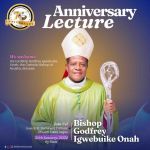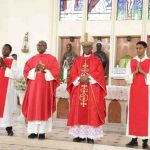2023 SACRAMENT OF CONFIRMATION
WHAT IS THE SACRAMENT OF
CONFIRMATION?
Culled
from https://opusdei.org/en-ng/article/what-is-the-sacrament-of-confirmation/
Extract by: Fr Charles Onwordi, OP
Confirmation
is one of the sacraments of the Catholic Church, but what exactly does it do in
the Christian's soul, and who can receive it?
Confirmation
is one of the sacraments of the Church. Together with Baptism and the
Eucharist, it constitutes the set of "the sacraments of Christian
initiation," that is, sacraments whose reception is necessary for the
fullness of the grace we receive in Baptism.
The
sacrament of Confirmation unites the Church more intimately and enriches her
with a special strength of the Holy Spirit. Thus those who receive it are
obliged to spread and defend the faith by word and deed, as true witnesses of
Christ.
1.
Is the sacrament of Confirmation present in the Bible and the history of the
Church?
In
the Old Testament, the prophets announced that the Spirit of the Lord would
rest upon the awaited Messiah. In the book of the Prophet Isaiah, the following
words are placed on the lips of the Messiah: "The Spirit of the Lord
Yahweh is upon me, because Yahweh has anointed me. He has sent me to preach
good news to the poor" (Isaiah 61 1-2). Something similar is also
announced to the entire people of God; to its members God says: "I will
put my spirit within you and cause you to walk in my statutes and be careful to
observe my ordinances" (Ezekiel 36:27). The descent of the Holy Spirit
upon Jesus at his Baptism by John was the sign that he was the one who was to
come, the Messiah, the Son of God. Having been conceived by the work of the
Holy Spirit, his whole life and his whole mission are realized in total
communion with the Holy Spirit which the Father gives him "without
measure." On repeated occasions, Christ promised this outpouring of the
Spirit, a promise he made first on Easter Day and then, more manifestly, on the
day of Pentecost. Filled with the Holy Spirit, the Apostles begin to proclaim
the wonders of God and Peter declares that this outpouring of the Spirit is the
sign of the messianic times. The Acts of the Apostles recounts that those who
believed in the apostolic preaching and were baptized received in turn the gift
of the Holy Spirit through the laying on of hands and prayer. It is this laying
on of hands that has been rightly considered by Catholic tradition as the
origin of the sacrament of Confirmation, which perpetuates in the Church the
grace of Pentecost.
This
biblical picture is completed by the Pauline and Johannine tradition that links
the concepts of "anointing" and "seal" with the Spirit
infused in Christians. The latter found liturgical expression in the most
ancient documents, with the anointing of the candidate with perfumed oil. This
anointing illustrates the name "Christian", which means "anointed",
and which has its origin in the name of Christ, whom "God anointed with
the Holy Spirit". And this rite of anointing exists to this day both in
the East and in the West. Therefore, in the East this sacrament is called chrismation,
anointing with chrism, or myron, which means "chrism". In the West
the name Confirmation suggests that this sacrament both confirms Baptism and
strengthens baptismal grace.
As
we read in the Acts of the Apostles, this sacrament was already lived in the
early Church: "When the Apostles who were in Jerusalem heard that Samaria
had accepted the Word of God, they sent Peter and John to them. These went down
and prayed for them that they might receive the Holy Spirit; for He had not yet
descended upon any of them; they had only been baptized in the name of the Lord
Jesus. Then they laid their hands on them and received the Holy Spirit"
(Acts 8:14-17). (Catechism of the Catholic Church, 1286-1289; Paul VI,
Apostolic constitution Divinae consortium naturae)
2.
What is the rite of Confirmation?
Through
the anointing with oil, the person confirmed receives "the mark", the
seal of the Holy Spirit. The anointing with holy chrism after Baptism, in
Confirmation and in Ordination, is the sign of a consecration. Through
Confirmation, Christians, that is, those who are anointed, participate more
fully in the mission of Jesus Christ and in the fullness of the Holy Spirit
that he possesses, so that their whole life may give off "the good odor of
Christ". An important moment that precedes the celebration of
Confirmation, but which, in a certain way, is part of it, is the consecration
of the Holy Chrism. It is the bishop who, on Holy Thursday, during the Chrism
Mass, consecrates the holy chrism for his entire diocese.
The
liturgy of the sacrament begins with the renewal of the Baptismal promises and
the profession of faith of those being confirmed. Thus it is clear that
Confirmation is an extension of Baptism. In the Roman rite, the bishop extends
his hands over all the persons being confirmed, a gesture which, since the time
of the Apostles, is the sign of the gift of the Spirit. And the bishop thus
invokes the outpouring of the Spirit: "Almighty God, Father of our Lord
Jesus Christ, who didst regenerate, by water and the Holy Spirit, these thy
servants and didst deliver them from sin: hear our prayer and send upon them
the Holy Spirit Paraclete; fill them with the spirit of wisdom and
understanding, with the spirit of counsel and fortitude, with the spirit of
knowledge and piety; and fill them with the spirit of thy holy fear. Through
Jesus Christ our Lord" (Ritual of Confirmation, 25).
The
essential rite of the sacrament follows. In the Latin rite, "the sacrament
of Confirmation is conferred by the anointing of the holy chrism on the
forehead, made by imposing the hand, and with these words: 'Receive by this
sign the gift of the Holy Spirit'" (Paul VI, Const. ap. Divinae consortium
naturae). The kiss of peace with which the rite of the sacrament concludes
signifies and manifests ecclesial communion with the bishop and with all the
faithful.
The
original minister of Confirmation is the bishop. Although the bishop may, in
case of necessity, grant to other priests the faculty to administer the
sacrament of Confirmation, it is appropriate that he himself confer it. (Catechism of the Catholic
Church, 1293-1301; 1312-1314; Paul VI, Apostolic const. Divinae consortium
naturae)
3.
What effects does the sacrament of Confirmation have?
The
effect of the sacrament of Confirmation is the special outpouring of the Holy
Spirit, as was once granted to the Apostles on the day of Pentecost. From this
fact, Confirmation brings an increase and deepening of baptismal grace: it
roots us more deeply in the divine filiation which makes us cry, "Abba!
Father!"; it unites us more firmly to Christ; it increases the gifts of
the Holy Spirit in us; it renders our bond with the Church more perfect; it
gives us a special strength of the Holy Spirit to spread and defend the faith
by word and action as true witnesses of Christ, to confess the name of Christ
boldly, and never to be ashamed of the Cross. Confirmation, like Baptism,
imprints on the Christian's soul a spiritual sign or indelible character; this
is why this sacrament can only be received once in a lifetime. (Catechism of
the Catholic Church, 1302-1305)
4.
Who can receive this sacrament?
Every
baptized person, not yet confirmed, can and should receive the sacrament of
Confirmation. With Baptism, Confirmation and Eucharist form a unity, it follows
that "the faithful are obliged to receive this sacrament in due time"
because without Confirmation and Eucharist, the sacrament of Baptism is
certainly valid and efficacious, but Christian initiation remains incomplete. In
the East, this sacrament is administered immediately after Baptism and is
followed by participation in the Eucharist, a tradition that emphasizes the
unity of the three sacraments of Christian initiation.
In
the Latin Church, this sacrament is administered when one has reached "the
age of reason". However, in danger of death, children should be confirmed
even if they have not yet reached the age of reason. There is a preparation for
the sacrament that helps to feel part of the Church of Jesus Christ. Each
parish is responsible for the preparation of the confirmands.
To
receive Confirmation, it is necessary to be in a state of grace. It is convenient to have
recourse to the sacrament of Penance in order to be purified for the gift of
the Holy Spirit. It is necessary to prepare oneself with a more intense prayer
in order to receive with docility and availability the power and graces of the
Holy Spirit. For Confirmation, as for Baptism, candidates should seek the
spiritual help of a sponsor. This should be the same as for Baptism in order to
emphasize the unity between the two sacraments. (Catechism of the Catholic
Church, 1306-1311).











